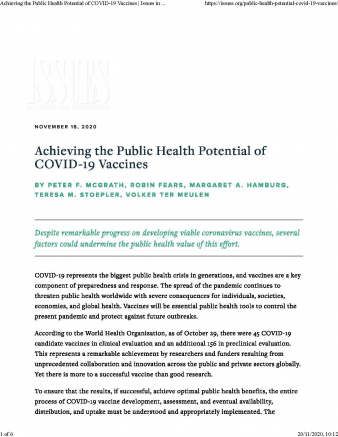COVID-19 represents the biggest public health crisis in generations, and vaccines are a key component of preparedness and response. The spread of the pandemic continues to threaten public health worldwide with severe consequences for individuals, societies, economies, and global health. Vaccines will be essential public health tools to control the present pandemic and protect against future outbreaks.
According to the World Health Organization, as of October 29, there were 45 COVID-19 candidate vaccines in clinical evaluation and an additional 156 in preclinical evaluation. This represents a remarkable achievement by researchers and funders resulting from unprecedented collaboration and innovation across the public and private sectors globally. Yet there is more to a successful vaccine than good research.
To ensure that the results, if successful, achieve optimal public health benefits, the entire process of COVID-19 vaccine development, assessment, and eventual availability, distribution, and uptake must be understood and appropriately implemented. The InterAcademy Partnership (IAP), the global network of more than 140 academies of science, engineering, and medicine, launched its own COVID-19 Expert Group in August to examine a broad range of health, social, environmental, and other direct and indirect consequences of the pandemic.
In September, IAP published a Communique on the development and distribution of vaccines against COVID-19. It raised three main concerns that could undermine the public health value of the collective vaccine effort. We highlight those concerns here.
This article was originally published in Issues in Science and Technology, a quarterly journal published by the National Academies of Sciences, Engineering, and Medicine and Arizona State University.


